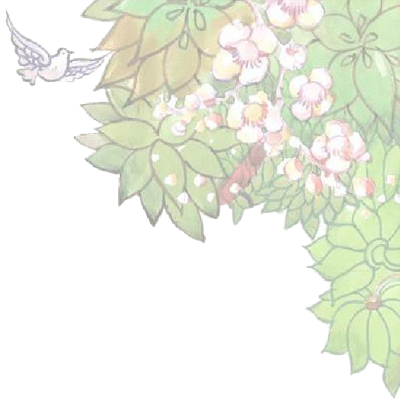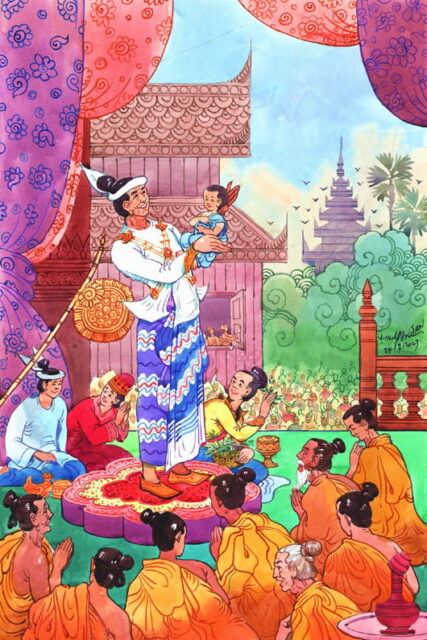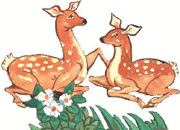06話 ゴータマ・シッダッタ ・・・・ 命名式

第1部 出家まで
第2章 生誕
06話 ゴータマ・シッダッタ・・・・命名式

菩薩降誕の五日後、スッドーダナ王は宮殿で命名式を開いた。学識あるバラモン百八人が命名式に招かれた。王はバラモンたちに居心地のよい席を用意し、美味な食べ物でもてなした。
バラモンたちの中では八人が傑出していた。ラーマ、ダジャ、ラッカナ、マンティ、ヤンニャ、スボージャ、スヤーマ、スダッタである。王はかれらに、赤ん坊の王子の身体のしるしから、将来を予言させた。身体のしるしを調べて、八人中七人がめいめい指二本を挙げて、こういった。
「偉大なる王よ、われらには王子に起きる二つの可能性が見えます。もし、在家の人生を選ばれましたら、武器を用いず正義だけで世界を統治する理想の帝王、転輪聖王となられるでありましょう。もし、出家されましたら、ブッダになられます」
しかし、いちばん若く、いちばん賢明なヤンニャ・バラモン、かれはコンダンニャ・バラモンとしても知られていたのだが、このヤンニャが指一本だけ挙げて、きっぱり、こう予言した。
「可能性はたった一つでございます。王子は出家なさって、確実にブッダになられます」
身体のしるしをこのように読み解いた若いバラモン、コンダンニャの予言が他のすべてのバラモンに受け入れられた。それで、学識あるバラモンたちもまた、王子が俗世の暮らしを捨てて出家するようになるだろうと述べた。そして、それは四つの予兆のあとで、四つとは、老人、病人、死骸、僧であるという。
王子がブッダのさとりに達するであろう、と予言してから、バラモンたちは王子に「シッダッタ」と命名した。〈望みをかなえる〉(義(アッタ)の成就、目的を完成する)という意味で、全世界の利益のために任務をうまく果たすだろうということを、それとなく示す一つの予兆としての名前だった。王家の姓は「ゴータマ」で、従ってシッダッタ・ゴータマと呼ばれた。
生母マハーマーヤー妃亡くなる
菩薩降誕の七日目、生母のマハーマーヤー妃が亡くなった。菩薩出産後の肥立ちが悪かったのではなく、それが寿命だったのである。王妃は兜率天に生まれ変わり、マーヤーデーヴァプッタ(サントゥシタ)という名の神(デーヴァ)(男神)になった。王妃の妹はマハーパジャーパティー・ゴータミーで、第二王妃であったが、マハーマーヤー妃の死で第一王妃となった。王子のこども時代、養母として世話し、王子の二、三日後に生まれたわが子ナンダ王子よりも世話をした。実のわが子は乳母に任せ、菩薩をほんとうのわが子のように面倒を見た。たいへんな愛情をそそぎ、ほとんどの時間を菩薩の世話に当てた。
国王犂耕祭で幼い菩薩が禅定に
毎年恒例の国王犂耕祭という季節の祭りがあった。王家だけではなく、都市のすべての人びともまた同じく参加した。大臣や家来、警護の者ら随行のお供を多数引き連れ、王が野辺に出向いた。幼い王子もいっしょに連れていき、王子を蒲桃(ふともも)(原注:パーリ語jambu(ジャンブ)、ラテン語Eugenia(エウゲニア)jambolana(ジャンボラナ))の木の涼しい木陰に置いて、子守りたちに面倒をみさせた。
さて、王みずから犂で田を耕して祭りの口火を切った。金の犂を引く、美しく飾った去勢雄牛の最初の二頭を、王が駆りたてた。王に続いて家来が、銀の引き具をつけて銀の犂を引く去勢雄牛たちを駆りたてた。祭りは盛大に挙行された。
幼い王子は、祭り見物に夢中の子守りたちに放ったらかしにされている自分に気づき、起き上がって、静かに足を組んで坐った。冥想を開始し、出息・入息(アーナパーナ)の修習(バーワナー)に集中した。たちまち色界(ルーパワチャラ)第一禅定(ジャーナ)に達した。そのとき、菩薩が坐っていた蒲桃の木の木陰は、もとのままの涼しい木陰だった。木陰は自然の太陽の運行と同調するようには動かなかったのである。
子守りたちがやっと自分たちの務めを思い出し、あわてて戻ってきた。幼い王子の姿を見つけて驚き、王に報告した。
「国王陛下、王子さまがひっそり、静かに坐っておられます。ほかの木の木陰は太陽につれて場所が変わっているのに、王子さまが身じろぎもせず坐り続けておられる蒲桃の木の木陰は、もはや真昼を過ぎてしまったのに、円形のそのままになっております」
スッドーダナ王はただちにそこへ行って、幼い王子に何が起きているか、目撃した。その奇跡を見て、王は「おお、わが親愛なる息子よ、これは父の二回目のそなたへの礼拝である」と、敬意を口にして礼拝したのであった。
※ 画像やテキストの無断使用はご遠慮ください。/ All rights reserved.

06 THE NAME-GIVING CEREMONY
On the fifth day after the birth of the Bodhisatta, King Suddhodana
held a name-giving ceremony in his palace. He invited one hundred and eight learned brahmins to participate in the ceremony. Comfortable seats were prepared for the brahmins, and the king served them with delicious foods.
Among the brahmins, there were eight distinguished ones: Rāma, Dhaja, Lakkhaṇa, Mantī, Yañña, Subhoja, Suyāma and Sudatta. The king asked them to foresee the marks on the body of the baby prince. Having examined the physical marks of the child, seven of them raised two fingers each and said: “O great king, we see two possibilities which may occur to your son. If he chooses to lead a life of a householder, he will become a Universal Monarch; if he renounces the world and becomes a recluse, he will become a Buddha.” But the youngest and wisest one—the brahmin Yañña, who was also known as the brahmin Koṇḍañña—raised only one finger and firmly foretold: “There is only one possibility. The prince will renounce the household life and certainly become a Buddha.”
The reading of the physical marks by the young brahmin Koṇḍañña was accepted by all of the other brahmins. Then, those learned brahmins also told the king that the prince would renounce worldly life and become a recluse after seeing four omens—an old man, a sick man, a corpse and a recluse. Having prophesied that the prince would attain Buddhahood, the brahmins gave him the name “Siddhattha”, which means “one whose wishes will be fulfilled”, as an omen indicating that he would successfully accomplish the task for the benefit of the entire world. His family name was “Gotama”, so he was also called Siddhattha Gotama.
The Passing Away of Queen Mahāmāyā
On the seventh day after the birth of the Bodhisatta, his mother Queen Mahāmāyā passed away—not because she had given birth to the Bodhisatta, but because her life-span had reached the end. She was reborn in the Tusita Heaven as a deva named Māyādevaputta (Santusita). The queen’s younger sister, Mahāpajāpatī Gotamī, who was also the second queen, then became the chief queen. She nursed and cared for the prince in his childhood even more than her own son who was born two or three days after the Bodhisatta’s birth. She entrusted her own son—Prince Nanda—to nurses and she looked after the Bodhisatta as her own son. She loved him very much, and most of the time the Bodhisatta was under her care.
The Royal Ploughing Festival
There was a regular seasonal festival held every year called the Royal Ploughing Festival. It was participated not only by the royal families but by all the people of the city as well. Accompanied by a great retinue of ministers, courtiers, bodyguards and other followers, the king went to the field. He brought with him the young prince and
put him under the cool shade of a rose-apple tree (Pāḷi: jambu; Latin: Eugenia jambolana) to be looked after by the nurses.
Now, the king opened the festival by ploughing the field first. He drove the first pair of beautifully decorated bullocks pulling a golden plough. The other courtiers followed the king, driving silver ploughs pulled by bullocks with silver harnessing. The festival was magnificently performed.
Finding himself left by his nurses who were enjoying the ceremony, the young prince then rose and sat cross-legged quietly. He started meditating, concentrating on breathing-in and breathing-out (ānāpāna bhāvanā). Soon, he attained the first rūpāvacara jhāna (the first stage of absorption concentration). At that time, the shade of the rose-apple tree under which the Bodhisatta was sitting remained the
same as before and did not cast its shade in a natural manner in line with the movement of the sun.
The nursing attendants finally remembered their duties and hurried back to find the young prince. Amazed by what they saw, they reported to the king: “Your Majesty, the young prince is sitting quietly and calmly. And though the shadow of other trees moved with the changing position of the sun, the shade of the rose-apple tree under which the prince sat kept unchanged even after noontide, retaining its round shape.”
King Suddhodana immediately came along and observed what was happening to the young prince. Seeing the miracle, he said: “O my dear son, this is the second time I, your father, salute you,” and paid obeisance to his son.
※ 画像やテキストの無断使用はご遠慮ください。/ All rights reserved.
アシン・クサラダンマ長老
1966年11月21日、インドネシア中部のジャワ州テマングン生まれ。中国系インドネシア人。テマングンは近くに3000メートル級の山々が聳え、山々に囲まれた小さな町。世界遺産のボロブドゥール寺院やディエン高原など観光地にも2,3時間で行ける比較的涼しい土地という。インドネシア・バンドゥンのパラヤンガン大学経済学部(経営学専攻)卒業後、首都ジャカルタのプラセトエイヤ・モレヤ経済ビジネス・スクールで財政学を修め、修士号を取得して卒業後、2年弱、民間企業勤務。1998年インドネシア・テーラワーダ(上座)仏教サンガで沙弥出家し、見習い僧に。詳しく見る
奥田 昭則
1949年徳島県生まれ。日本テーラワーダ仏教協会会員。東京大学仏文科卒。毎日新聞記者として奈良、広島、神戸の各支局、大阪本社の社会部、学芸部、神戸支局編集委員などを経て大阪本社編集局編集委員。1982年の1年間米国の地方紙で研修遊学。2017年ミャンマーに渡り、比丘出家。詳しく見る

※ 画像やテキストの無断使用はご遠慮ください。
All rights reserved.

